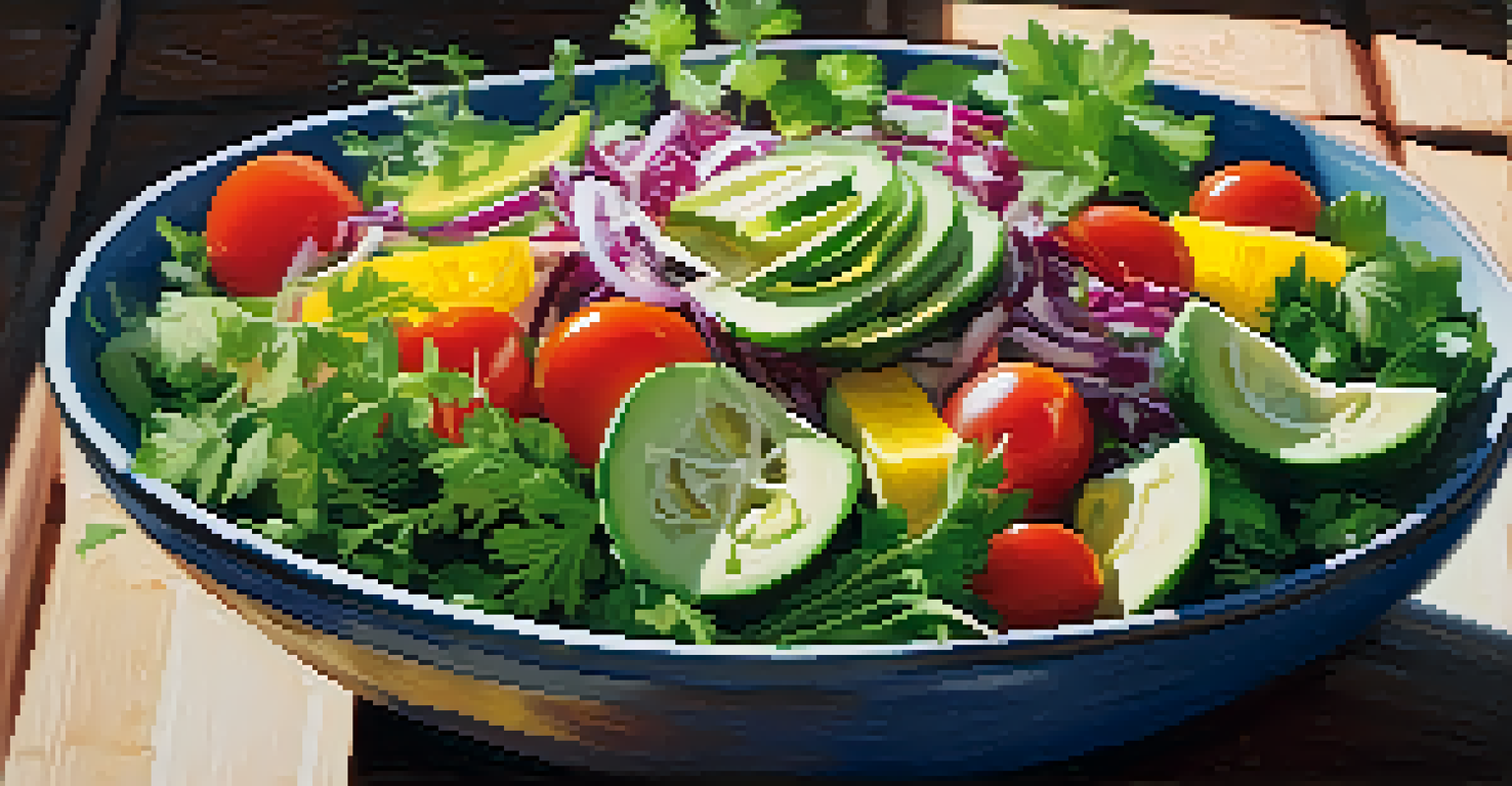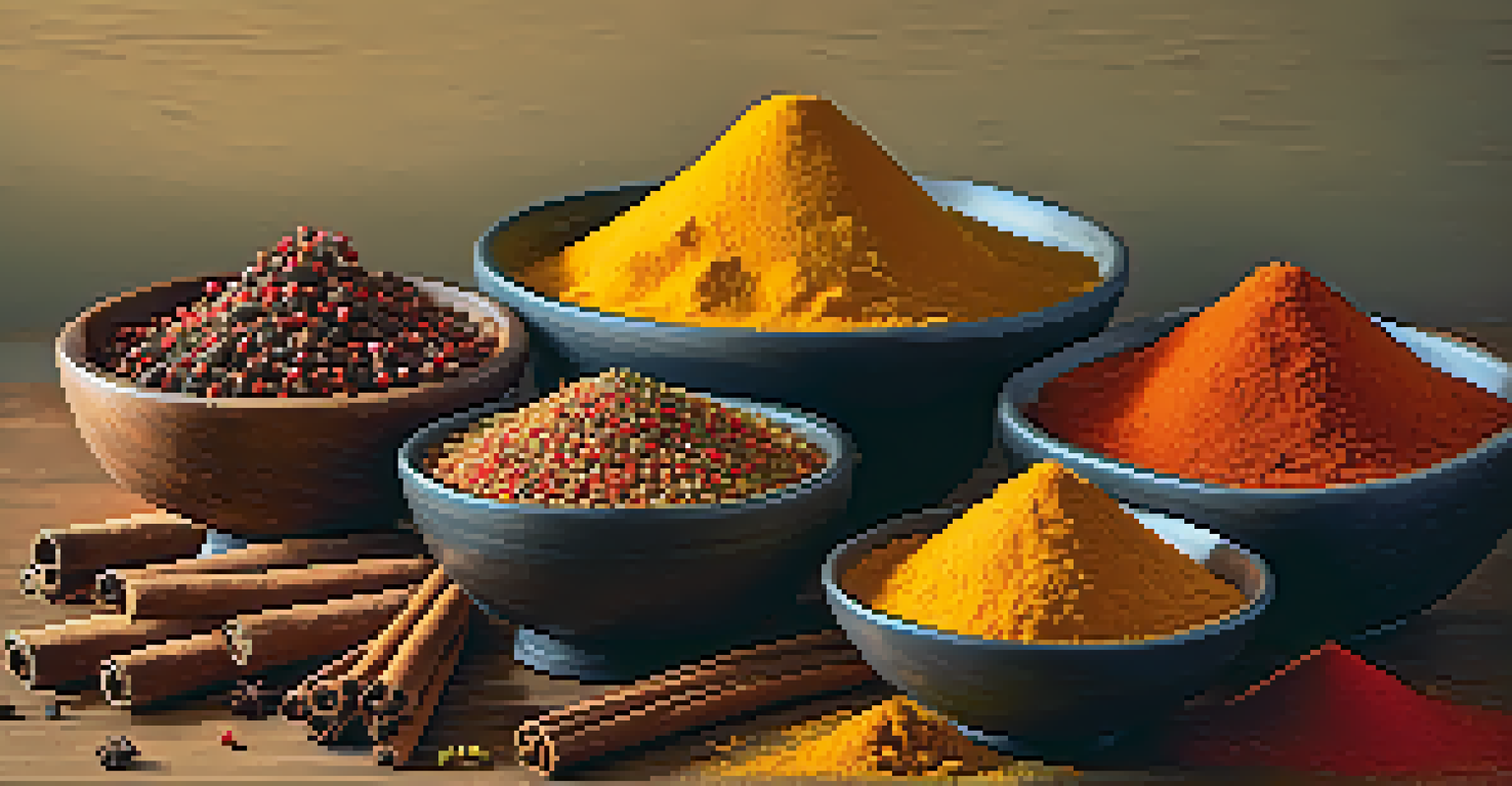Culinary Herbs and Spices for Preventive Nutrition

Understanding Preventive Nutrition and Its Importance
Preventive nutrition is all about taking proactive steps to maintain health and prevent disease. It emphasizes the role of diet in reducing the risk of chronic illnesses, such as heart disease and diabetes. By incorporating specific foods into our diets, we can bolster our immune system and enhance overall wellness.
Let food be thy medicine and medicine be thy food.
Culinary herbs and spices play a vital role in this preventive approach. They not only add flavor to our meals but also provide a plethora of health benefits. For instance, herbs like basil and rosemary are rich in antioxidants, which help combat oxidative stress in the body.
Understanding how these flavorful ingredients contribute to nutrition allows us to make informed choices. By integrating more herbs and spices into our cooking, we can elevate our meals and our health simultaneously.
The Nutritional Power of Culinary Herbs
Culinary herbs, such as parsley, cilantro, and thyme, are packed with essential vitamins and minerals. For example, parsley is rich in vitamin K, which is crucial for bone health and blood clotting. These nutrients support various bodily functions and contribute to long-term health.

Additionally, herbs often contain compounds that can support digestion and reduce inflammation. For instance, peppermint is known for its soothing properties, helping alleviate digestive discomfort. Incorporating these herbs into daily meals can be a simple yet effective way to enhance nutritional intake.
Preventive Nutrition Boosts Health
Adopting preventive nutrition through a diet rich in herbs and spices can significantly reduce the risk of chronic diseases.
Using fresh or dried herbs in cooking not only enriches the flavors of dishes but also boosts their nutritional value. A sprinkle of fresh basil on a pasta dish or adding thyme to roasted vegetables can transform an ordinary meal into a health-boosting feast.
Spices: Tiny Powerhouses of Flavor and Health
Spices, while often small in quantity, pack a punch when it comes to flavor and health benefits. For instance, turmeric, known for its vibrant yellow color, contains curcumin, a compound with powerful anti-inflammatory properties. This makes it a popular choice for those looking to reduce inflammation in the body.
The doctor of the future will no longer treat the human frame with drugs, but rather will cure and prevent disease with nutrition.
Similarly, cinnamon is not just a sweet addition to baked goods; it has been shown to help regulate blood sugar levels. This can be particularly beneficial for individuals managing diabetes or those looking to maintain stable energy throughout the day.
Incorporating spices into your diet doesn't have to be complicated. A dash of cumin in your chili or a sprinkle of paprika on roasted vegetables can enhance both taste and nutrition effortlessly.
The Role of Antioxidants in Herbs and Spices
Antioxidants play a crucial role in our health by neutralizing free radicals, which can cause cellular damage. Many culinary herbs and spices are rich in antioxidants, making them valuable additions to our diets. For example, oregano has one of the highest antioxidant levels among herbs, providing a potent boost to our overall health.
Regular consumption of antioxidant-rich foods can help lower the risk of chronic diseases, including heart disease and cancer. By adding herbs like sage and spices like cloves to our meals, we can enhance our antioxidant intake while enjoying delicious flavors.
Herbs Enhance Nutritional Value
Culinary herbs like parsley and thyme are packed with essential nutrients that support overall health and digestion.
Making these small changes in our cooking can lead to significant health benefits over time. It's a simple yet effective strategy for preventing disease and promoting longevity.
Herbs and Spices for Digestive Health
Digestive health is foundational to overall well-being, and certain herbs and spices can aid in this area. Ginger, for example, has long been revered for its ability to soothe nausea and promote healthy digestion. Adding ginger to teas or stir-fries can make a noticeable difference in digestive comfort.
Similarly, fennel seeds have been used for centuries to relieve bloating and gas. Incorporating fennel into meals or brewing it as a tea can support digestive health and provide relief from discomfort.
By understanding how these herbs and spices work, we can make informed choices that promote a healthy gut. A few simple additions to our meals can lead to improved digestion and enhanced overall health.
Herbs and Spices for Heart Health
Heart health is a primary concern for many, and certain herbs and spices can play a supportive role. Garlic, well-known for its strong flavor, has been linked to reduced blood pressure and lower cholesterol levels. Including garlic in your diet can be both delicious and beneficial for heart health.
Similarly, the spice cayenne pepper may help improve circulation and lower blood pressure. Its active ingredient, capsaicin, has been shown to have positive effects on cardiovascular health. Adding a bit of heat to your meals can be a heart-healthy choice.
Spices Offer Powerful Health Benefits
Incorporating spices such as turmeric and cinnamon can enhance both flavor and health by providing anti-inflammatory and blood sugar-regulating properties.
By focusing on these flavorful ingredients, we can take proactive steps towards maintaining a healthy heart. It's a tasty way to nourish our bodies and support our cardiovascular system.
Practical Tips for Using Herbs and Spices in Your Cooking
Incorporating herbs and spices into your meals doesn't have to be daunting. Start by experimenting with different flavors in your cooking—try adding fresh herbs to salads or spices to roasted vegetables. This exploration can lead to newfound favorites and enhance your culinary skills.
Another tip is to keep a variety of dried herbs and spices on hand. They can be easily added to any dish, providing both flavor and nutrition without requiring extensive preparation. A well-stocked spice rack can inspire creativity in the kitchen.

Finally, don't hesitate to combine herbs and spices. Mixing basil with oregano or cinnamon with nutmeg can create a symphony of flavors that elevates your meals. Embracing these ingredients allows us to enjoy both their taste and health benefits.